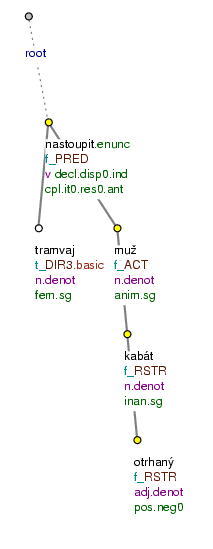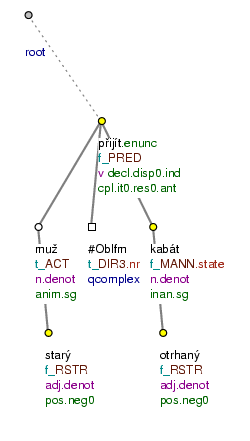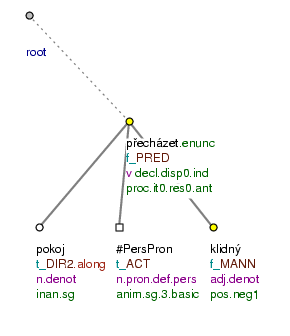The dependency relations with certain adjuncts expressed by adverbs (see Section 11.1.2, "Ambiguous dependency relations with adjuncts expressed by adverbs") or prepositional phrases (see Section 11.1.1, "Ambiguous relations with adjuncts expressed by prepositional phrases") need not be unambiguous because the scope of the meaning of the adverbs and prepositional phrases can vary: they do not have to relate only to one modification within the sentence but they can relate to several modifications at the same time.
Only one dependency relation can be represented by an edge in the tree. Due to the fact that with adjuncts expressed by adverbs or prepositional phrases (unlike with predicative complements; see Section 10, "Predicative complement (dual dependency)") we often lack enough indications to define the relations unambiguously, we represent only one (basic) dependency relation of such modifications and we do not establish any special attributes to express the other possible semantic relations.
The basic annotation rule is as folllows:
-
if a free modification (expressed by a prepositional phrase or adverb) modifies a verb, it is dependent on this verb regardless of any other semantic relations it may enter into.
The only exception are the cases of the so-called dual function (see Section 11.2, "Dual function of a single modification").
Free modifications (adjuncts) expressed by a prepositional phrase can specify a verbal event or state or they can modify a noun. We consider those structures ambiguous or problematic in which an adjunct expressed by a prepositional phrase modifies a verbal event/state and a noun at the same time, or those structures in which there are more interpretations possible (modification of a noun, verb, or more nouns simultaneously).
This section deals with the description of annotation rules for structures in which a modification expressed by a prepositional phrase unambiguously modifies a noun while other relations (particularly the relation to a verb) are less obvious. Examples:
Starý muž přišel v otrhaném kabátě (=lit. (The) old man came in (a) shabby coat.).
Potkali Petra ve smokingu. (=lit. (They) met Petr in tuxedo)
Jeníček šel do lesa s Mařenkou. (=lit. Johnny went to (the) woods with Mary.)
Annotation varies depending on the fact whether the prepositional phrase and the noun occur in the surface structure of the sentence:
-
in a contact position.
-
in a distance position.
Contact position. In the constructions in which a noun and an adjunct expressed by a prepositional phrase are in a contact position, the adjunct depends on the node for the governing verb always when it is not obvious that this adjunct only modifies the noun it is in contact with.
In unambiguous cases (the prepositional phrase only modifies the noun) the node representing the prepositional phrase depends on the noun. Cf.:
-
Do tramvaje nastoupil muž v otrhaném kabátě. (=lit. On (the) tram got (a) man in (a) shabby coat.)
The prepositional phrase v (otrhaném) kabátě (=lit. in a (shabby) coat) only modifies the noun muž (=man). Cf. Fig. 6.184.
Other examples:
Lupič s pistolí přepadl prodavačku s tržbou v kufříku (=lit. (A) robber with (a) gun attacked (a) shop_assistant with sales in (a) briefcase.)
Přepadl prodavačku s tržbou v kufříku (=lit. (He) robbed (a) shop_assistant with sales in (a) briefcase.) . (The shop assistant had the money in the briefcase.)
Tatínek s maminkou šli do divadla (=lit. Daddy with mummy went to (the) theatre.)
Potkali muže ve smokingu (=lit. (They) met (a) man in (a) suit.) (The man was wearing the suit.)
On the other hand, in sentences in which the semantic relations are less obvious (there are two (or more) interpretations possible) the adjunct depends on the node for the governing verb. Cf.:
-
Vyfotografoval Evu na pláži (=lit. (He) photographed Eve on (the) beach.).
It is not obvious who was on the beach (Eve, the photographer or both?). The node representing the prepositional phrase on the beach will depend on the node for the verb fotografovat (=to photograph).
Distance position. In those structures in which an adjunct modifies a verbal event or state and a noun at the same time, the adjunct always depends on the node for the governing verb. This holds particularly for cases in which the noun and the adjunct expressed by a prepositional phrase are in distance position (and in which the noun is not present in the surface structure of the sentence). We assume that a modification expressed by a prepositional phrase that modifies a noun but occurs in a distance position from it, in fact modifies both the noun and the verb. Cf.:
-
Starý muž přišel v otrhanémkabátě (=lit. (The) old man in (a) shabby coat.)
The modification v (otrhaném) kabátě (=in a (shabby) coat) modifies both the noun muž (=man) and the verb přijít (=to_come). In the tree such a modification depends on the verb. Cf. Fig. 6.185.
Other examples:
Potkali Petra ve smokingu. (=lit. (They) met Peter wearing (a) suit.) (They were wearing the suit.)
Tatínek šel do divadla s maminkou (=lit. Dad went to (the) theatre with mum.)
Přepadl prodavačku s pistolí v ruce (=lit. (He) attacked (the) shop_assistant with (a) gun in (his) hand.) (He had the gun in his hand.)
Lupič prodavačku přepadl s tržbou v kufříku (=lit. (A) robber (the) shop_assistant attacked with sales in (a) briefcase.)
In those structures that enable multiple interpretation of the semantic relations, the decision is made on the basis of the available context. If the context does not provide enough indications for an unambiguous solution, we take the adjunct to modify the verb. Examples:
Poslali ho k babičce v dobrém rozmaru (=lit. (They) sent him to grandma in good mood.). (Who was in the good mood?)
Zahlédl ji při odchodu z divadla (=lit. (He) saw her - leaving - (the) theatre.) (Who was leaving the theatre?)
The rule for free modifications expressed by adverbs is as follows: in those constructions in which the interpretation of the semantic relations is ambiguous, the modification depends on the governing verb. If the modification expressed by an adverb is in a distance position w.r.t. the noun it potentially relates to (or if the noun is not present in the surface structure of the sentence), it is always questionable whether this noun is directly modified by the adjunct. Cf.:
-
Přecházel po pokoji neklidně (=lit.(He) was_pacing - (the) room restlessly.).
The modification neklidně (=restlessly) is represented as dependent on the verb although it also modifies the Actor of the governing verb. Cf. Fig. 6.186.
Other examples:
Babička seděla shrbeně (=lit. Grandma was_sitting hunched.).
Pavel odešel schlíple (=lit. Pavel left broken.).
Pavel schlíple odešel (=lit. Pavel in_(a)_broken_way left.).
Hanka běhala naboso (=lit. Hanka was_running barefoot.).
Bratr namaloval vajíčka modře/namodro (=lit. (My) brother dyed (the) eggs blue.).
Předseda mu to přinesl osobně (=lit. (The) chairman him it brought himself.).
Free modifications (adjuncts) with the functors MOD (see Section 7.3, "MOD") and ATT (see Section 7.1, "ATT") show a behaviour similar to that of rhematizers (see Section 6, "Rhematizers"). The degree of probability or the expression of an attitude always affect a particular part of the utterance, a particular subtree. Cf.:
-
Otec přijede asi.
MODzítra večer (=lit. Father will_come perhaps tomorrow evening.) -
Otec přijede zítra asi.
MODvečer (=lit. Father will_come tomorrow perhaps in_(the)_evening.) -
Otec asi.
MODpřijede zítra večer (=lit. Father might come tomorrow in_(the)_evening.) -
Zítra večer přijede otec a asi.
MODi matka (=lit. Tomorrow night will_come father and perhaps also mother.)
These differences have been represented in the tectogrammatical trees only to a limited extent so far. In those cases in which the governing verb is not part of the semantic scope of the modification with the functors MOD or ATT, the modification with the functor MOD or ATT depends on the effective root node of that subtree that is in its scope. In other cases this adjunct depends on the node for the governing verb and its scope is blurred.
!!! This is a temporary solution; in the future the modifications with the functors MOD and ATT will need annotation rules similar to those for rhematizers (see Section 6.2, "Basic guidelines regarding the position of rhematizers in tectogrammatical trees").


